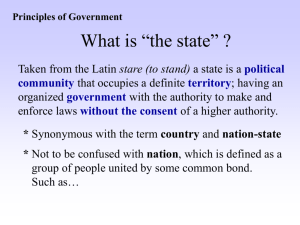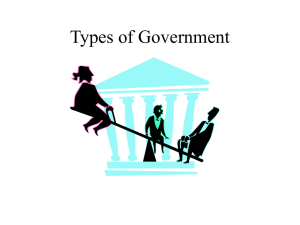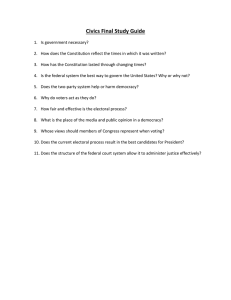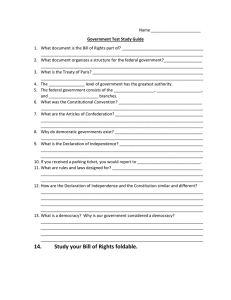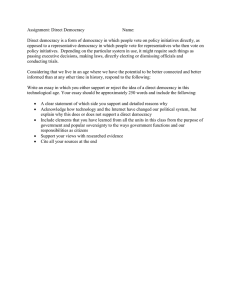Ch. 1 Section 1 Government of the People, by the
advertisement
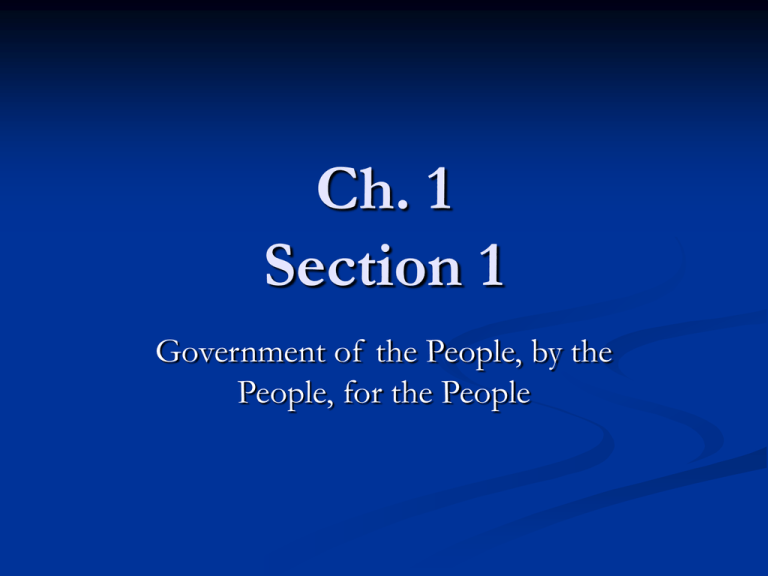
Ch. 1 Section 1 Government of the People, by the People, for the People What is Civics? Civics is the study of the rights and duties of citizens. The concept of citizenship dates back as far as 2500 years ago in ancient Greece and Rome. Citizens were only men who owned property Today, most people are citizens of the country they live in. It is give and take though, citizens agree to accept the government’s authority in exchange for rights and protections The Need for Government A government is the ruling authority for a community. It has the power to make and enforce laws for its members. Thomas Hobbes in 1651 wrote “Leviathan” in which he explained why people needed government. Hobbes claimed that without government, human beings would compete for territory, resources, and power. Fighting would be common, and survival would depend on strength and cunning. The Need for Government (cont.) Hobbes believed in a “social contract” between people and government. People exchange their individual liberty for group safety and social order. Hobbes believed that we as a people need to move away from the notion of a state of nature where only the strong survive in a freedom of chaos The Need for Government (cont.) John Locke accepted the idea of a social contract between ruler and the ruled but believed that people only gave up some of their individual rights. People kept the right to live, own property, and enjoy liberty. Rulers were expected to uphold these rights A ruler who violated those rights broke the social contract. The Need for Government (cont.) Locke believed that government existed for one purpose: protect the people’s rights. Any ruler who denied the people their basic rights was considered a tyrant. This would mean they could be justly overthrown. The Functions of Government 1. Governments are meant to provide 4 functions for the people: Keep order make laws to prevent conflicts and to settle conflicts that do arise; enforce laws and establish courts to punish violators The Functions of Government (cont.) 2. Provide Security defend citizens and their land from enemies (foreign and domestic); sets up branches of the armed forces and government agencies that actively search for sources of trouble. The Functions of Government (cont.) 3. Provide services create and manage libraries, schools, hospitals, parks, and recreation centers; keep the public safe and healthy ex. Welfare programs, job training, fire dept, FDA, government inspection (elevators, amusement parks) The Functions of Government (cont.) 4. Guide the community formulate public policy, or course of government action to achieve community goals what steps must be taken to strengthen national security? What is our budget for the fiscal year for the state? Ex. Creating a budget; conducting foreign relations with our allies. (what benefits our citizens) Democratic Government The foundations of democracy, government in which the people rule, began in the Greek city of Athens. Athens had a direct democracy, all citizens met to debate government matters and vote firsthand. In our society this would be impractical because of our population size. The U.S. has a representative democracy. We choose smaller groups to represent us, make laws, and govern on our behalf. (Senate, House of Reps.) Democratic Government (cont.) What makes our government a democracy is the fact that we have free and open elections. But what makes our elections free and fair: 1. Everyone’s vote carries the same weight, “one person, one vote” 2. All candidates have the right to express their views freely to the public 3. legal voting requirements are kept to a minimum 4. Citizens vote freely on a secret ballot, without fearing punishment for their decision. Democratic Government (cont.) Citizens also agree that when differences of opinion arise, we will abide by what most people want (majority rule). The majority however, must respect the rights of those in the minority. 5 Fundamental Principles of American Democracy 1. Rule of Law all people, even those who govern are bound by the law 2. Limited government government may do only what the people give it the power to do. 3. Consent of the governed citizens are the source of the governments power 5 Fundamental Principles of American Democracy (cont.) 4. Individual rights In an American democracy, individual rights are protected by the government 5. Representative government people elect government leaders to make the laws and govern on their behalf

